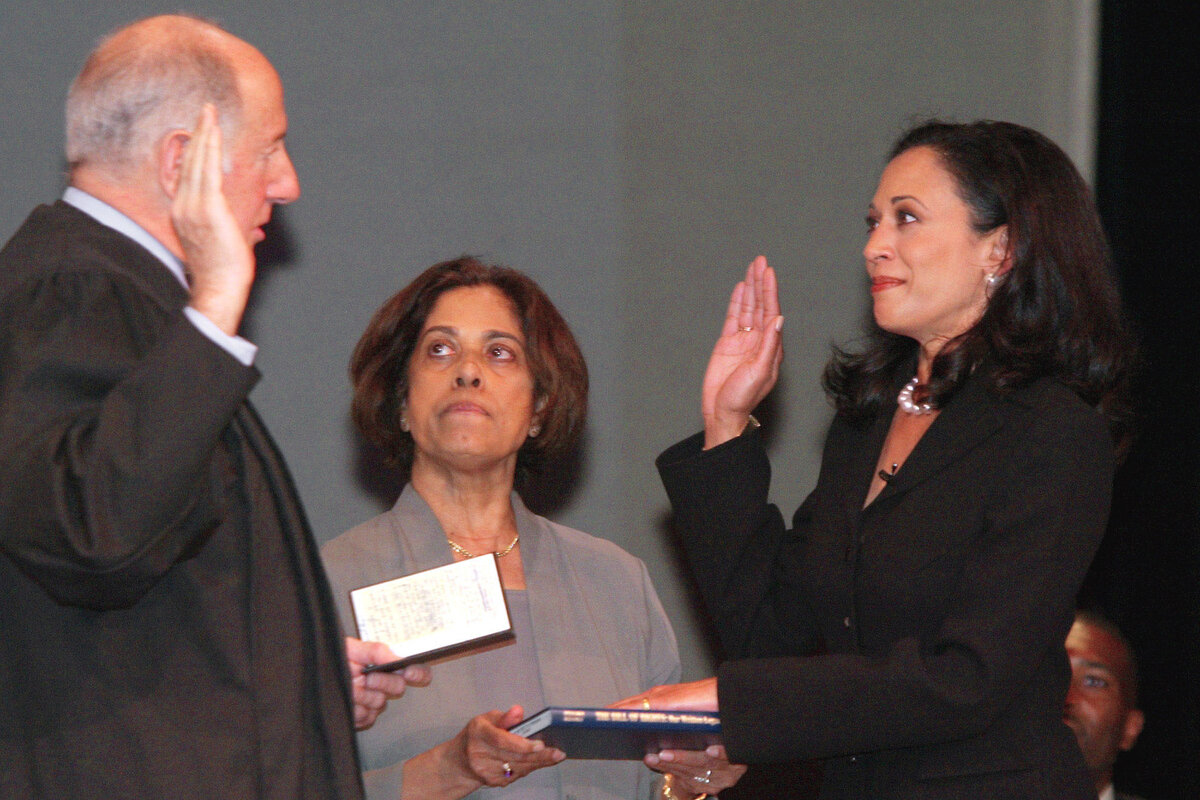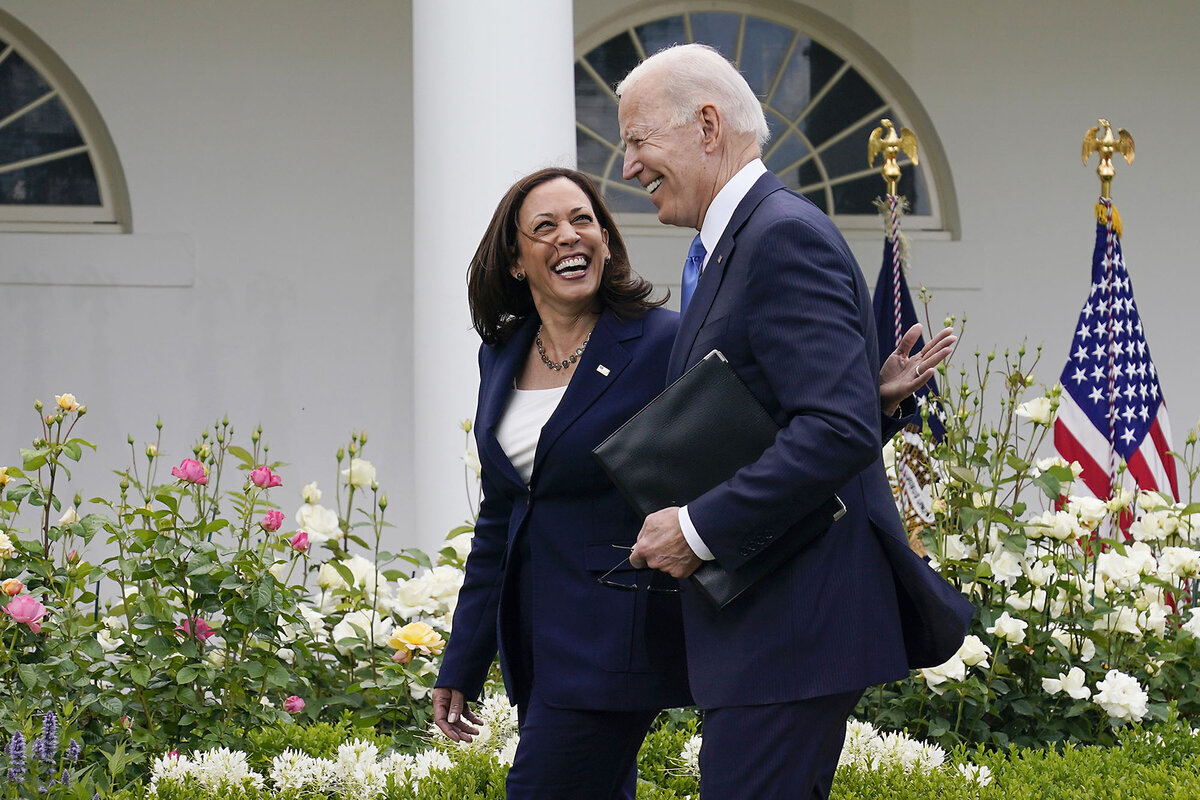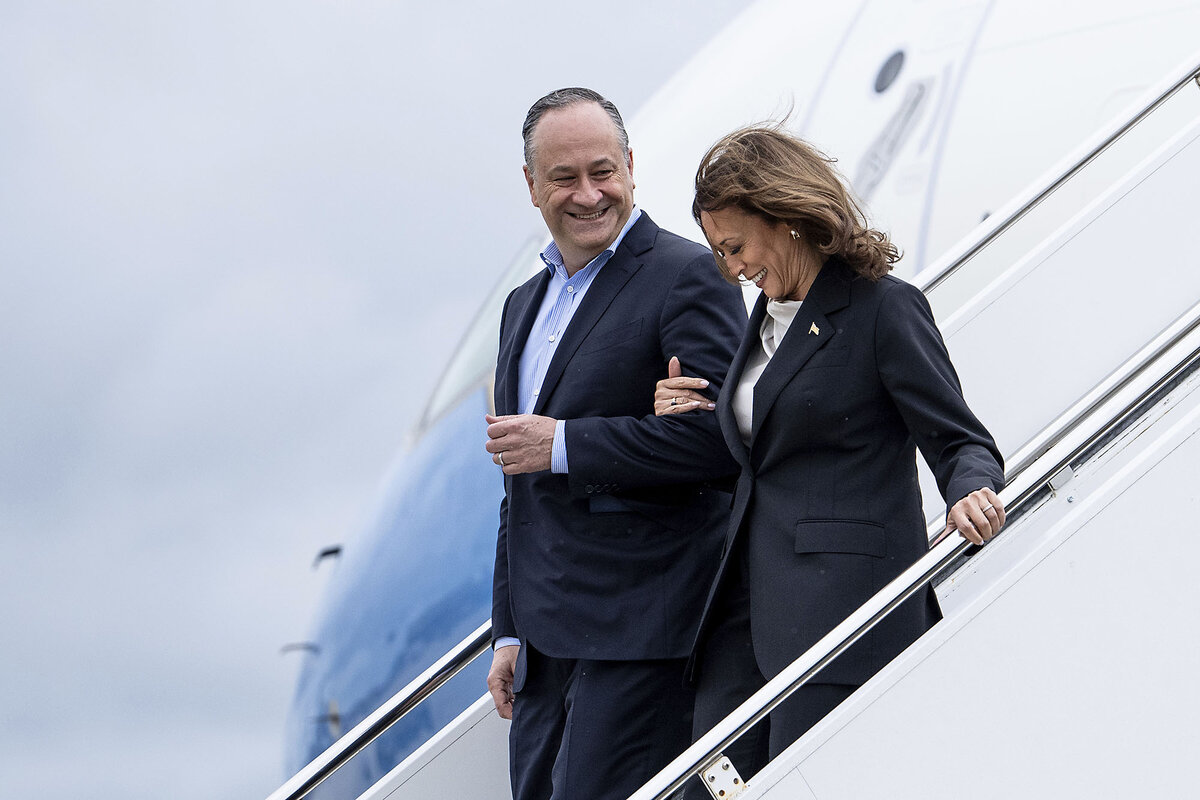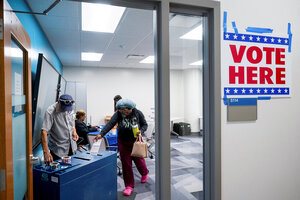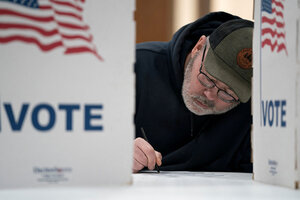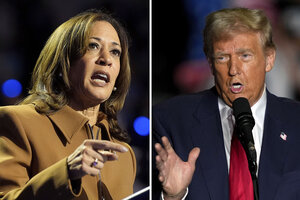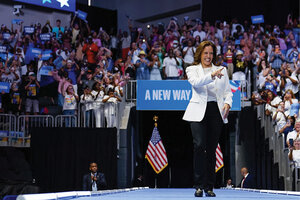From sidekick to spotlight: 5 things to know about Kamala Harris
Loading...
| Washington
Vice President Kamala Harris captured Americans’ focus in an instant Sunday when President Joe Biden bowed out of the presidential race and endorsed Ms. Harris as the Democratic nominee instead.
Within 36 hours, Ms. Harris had solidified her front-runner status for the Democratic nomination. Though Ms. Harris has been an elected official for years, her policies and personal history are less well known than prior presumptive presidential nominees at this point in the election cycle.
Why We Wrote This
Kamala Harris is a household name as vice president, but she’ll be reintroducing herself to voters as she moves toward the Democratic Party’s presidential nomination. Here are some key facts from her career and personal life.
This close to a presidential election, the candidate leading a major-party ticket would have already faced months of scrutiny. After decades in public service, Ms. Harris is vetted, but she’s not necessarily familiar to all voters. Several polls over the past year show her unfavorability rating among voters hovering just over 50%.
A brief picture of Ms. Harris, from her legislative record to her appeal to Generation Z, shows some of her political strengths and weaknesses and the personal beliefs that have shaped her career. Largely raised by a single mother in California, the vice president was part of a school busing effort to integrate public schools as a child, worked as a prosecutor, and is known as a “foodie” who regularly cooks Sunday family dinners.
Vice President Kamala Harris captured Americans’ focus in an instant Sunday when President Joe Biden bowed out of the presidential race and endorsed Ms. Harris as the Democratic nominee instead.
Within 36 hours, Ms. Harris had solidified her front-runner status for the Democratic nomination. Though Ms. Harris has been an elected official for years, her policies and personal history are less well known than prior presumptive presidential nominees at this point in the election cycle.
This close to a presidential election, the candidate leading a major-party ticket would have already faced months of scrutiny. After decades in public service, Ms. Harris is vetted, but she’s not necessarily familiar to all voters. Several polls over the past year show her unfavorability rating among voters hovering just over 50%. Here’s a brief picture of Ms. Harris, from her legislative record to her appeal to Generation Z.
Why We Wrote This
Kamala Harris is a household name as vice president, but she’ll be reintroducing herself to voters as she moves toward the Democratic Party’s presidential nomination. Here are some key facts from her career and personal life.
She integrated public schools
Born in Oakland, California, Ms. Harris grew up surrounded by social justice movements. Her mother and father – who emigrated from India and Jamaica, respectively – were civil rights activists who met at the University of California, Berkeley. They later divorced, and Ms. Harris and her sister were raised primarily by their mother, a breast cancer researcher who died in 2009. The sisters had long rides to school as part of a busing effort to integrate public schools in Berkeley during the 1970s.
“There was a little girl in California who was part of the second class to integrate her public schools, and she was bused to school every day, and that little girl was me,” Ms. Harris said on the debate stage during the 2020 presidential primary.
After high school, Ms. Harris attended Howard University in Washington, D.C. Today, she’s often spotted in attire bearing the name of her alma mater. On July 21, the day Mr. Biden endorsed Ms. Harris, she was said to have spent the day taking calls, surrounded by family and aides, and wearing a Howard University sweatshirt.
She was a prosecutor first
After returning to California for law school, Ms. Harris spent three years as a prosecutor in the Alameda County District Attorney’s Office, a credential that would later prove a mark against her among progressives in the party. Ms. Harris’ view of the role of a prosecutor was nuanced.
“I knew quite well that equal justice was an aspiration. I knew that the force of the law was applied unevenly, sometimes by design,” she wrote in her 2019 book “The Truths We Hold.” “But I also knew that what was wrong with the system didn’t need to be an immutable fact. And I wanted to be part of changing that.”
In 2004, Ms. Harris was elected district attorney of San Francisco, and in 2011 she became the first South Asian – and the first woman – to be elected attorney general of California. Donald Trump donated $5,000 to Ms. Harris’ campaign in 2011 and another $1,000 to her 2013 campaign.
Ms. Harris won her first Senate campaign in 2016 and arrived in Washington as the first Indian American senator. She sought the Democratic nomination for president in 2020, with her sister running her campaign. Just before Mr. Biden was nominated, he chose Ms. Harris as his vice president.
She carries a mixed record as vice president
Ms. Harris has worked to carve out her own issues profile as vice president. She has focused on abortion rights over the last several years, a topic in which other Democrats say she is adept at communicating the differences between the parties.
“This is a fight for freedom – the fundamental freedom to make decisions about one’s own body and not have their government tell them what they’re supposed to do,” said Ms. Harris in Florida in May.
Now, Democrats want to see Ms. Harris go on offense against Mr. Trump on abortion and the rule of law, leaning into her background as a prosecutor.
On other issues, Ms. Harris doesn’t gain much favor. Tasked by Mr. Biden with addressing root causes of migration to the U.S. southern border early in their administration, Ms. Harris faced criticism from Democrats and Republicans alike for taking too long to plan a trip to the border. Illegal border crossings reached record highs under the Biden-Harris administration, and immigration remains a political weakness for Democrats.
Vice presidential duties include serving as president of the Senate, where Ms. Harris broke the record for casting the most tiebreaking votes – including a vote that sealed the confirmation of Justice Ketanji Brown Jackson, the first Black woman to serve on the Supreme Court.
She embraces memes
Ms. Harris’ momentum on social media surged in recent weeks and swept across TikTok, Instagram, and X, saturating the platforms with positive content focusing on the vice president.
Memes, remixed videos, and slogans focusing on Ms. Harris often tie her to pop culture references. In many cases, clips of Ms. Harris saying or doing things once deemed “cringey” were recast by people online. Suddenly, she’s cool. And her campaign has been quick to capitalize on the generational freshness she brings to the race and the potential to energize younger demographics.
One of the most viral videos is of Ms. Harris repeating a lesson from her mother: “You think you just fell out of a coconut tree?” she asks in the video, laughing. She becomes serious. “You exist in the context of all in which you live and what came before you.”
The video circulated for months, spawning memes often presenting it as awkward or nonsensical. Now, though, the coconut tree content online is reflective of, in particular, younger voters’ excitement to see the vice president as a candidate. The dialogue from the video went viral on TikTok as content creators edited the audio over videos of themselves. Members of Congress have even joined in, posting endorsements of the vice president accompanied by emoji of coconut trees or, in one instance, creating an image of themselves climbing a coconut tree.
Ms. Harris’ staff has embraced the swirl of social media content. The campaign website’s error page now reads, “This page exists in the context of all that came before it.”
Long before memes about coconut trees, fans of Ms. Harris dubbed themselves the “KHive,” inspired by “BeyHive,” the name that online fans of the singer Beyoncé gave themselves. The KHive hashtag quickly became popular on social media leading up to the 2020 election as a way for supporters to rally behind Ms. Harris online, often rising up in defense of her.
She’s a foodie
In 2014, Ms. Harris married Doug Emhoff, a lawyer with two teenagers. Ms. Harris recalls being sensitive to how his children might feel, remembering how she experienced her own parents’ divorce. One of her favorite routines, she wrote in her book, is Sunday family dinner – a tradition she began after getting engaged to Mr. Emhoff.
“Everyone knows that Sunday family dinner is nonnegotiable, that we come together, all of us around the table, relatives and friends always welcome, and I cook a meal for us to share,” she wrote. “It’s really important to me.”
Ms. Harris, who loves to cook, doesn’t shy away from using food as a political prop. During the 2020 campaign she filmed a short YouTube series called “Cooking With Kamala,” in which she was joined by guests like Democratic Sen. Mark Warner and actor Mindy Kaling. And in another video from 2019 that went viral, she’s filmed enthusiastically explaining to a reporter the best way to brine a Thanksgiving turkey, in the moments before a TV interview.







